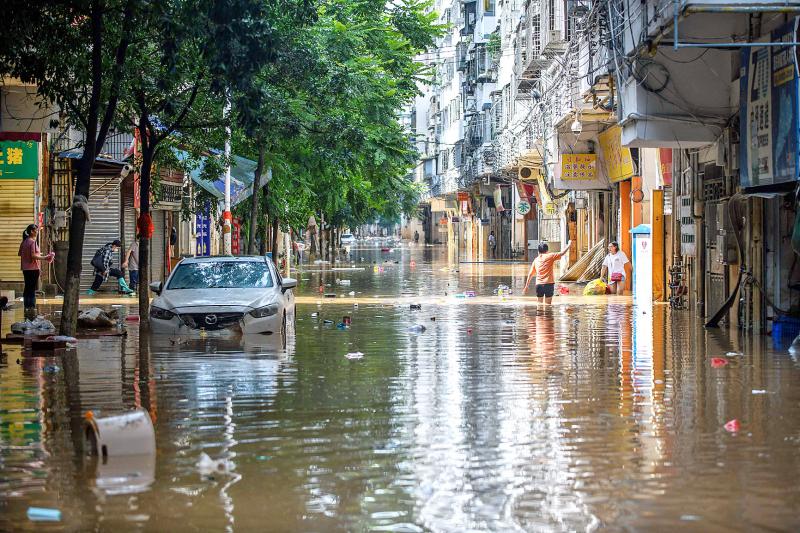Record floods hit parts of southern China yesterday as heavy rains pushed water levels in the Pearl River Delta to their highest in almost a century.
Hundreds of thousands of people have been evacuated from the worst-hit parts of the region, which includes Guangdong Province, a manufacturing and logistics hub that is home to China’s tech capital, Shenzhen.
The Chinese Ministry of Water Resources on Wednesday placed its highest flood alert on the Pearl River basin, saying that water levels at one location “surpassed historical records” and that the provincial capital, Guangzhou, would be severely affected.

Photo: AFP
Images from Shaoguan, north of Guangzhou, showed residents on Wednesday making their way through flooded main roads, as water in some areas reached the tops of cars.
The muddy floodwater inundated shops and buildings, and people were seen clearing away debris.
The low-lying Pearl River Delta region is home to the economic powerhouses of Guangzhou and Shenzhen, as well as several smaller but densely populated cities with major manufacturing industries.
Emergency management authorities earlier this week said that direct economic losses were estimated at about US$253 million.
Under the highest alert level, at-risk areas in Guangdong have been ordered to take all necessary measures, including suspending work at factories and closing schools to minimize damage.
Other regions in southern China, including coastal Fujian Province and Guangxi, have also been affected by record rains this month, forcing hundreds of thousands to evacuate.
Summer floods are common in parts of China, but these have been getting more extreme in recent years as the climate changes.
Chinese authorities have not directly linked this year’s extreme floods to climate change. Some local media have dubbed it a “once-in-a-century flood,” reporting water levels that have surpassed the highest recorded, in 1931, and approaching the area’s worst floods, which were in 1915.

BACKLASH: The National Party quit its decades-long partnership with the Liberal Party after their election loss to center-left Labor, which won a historic third term Australia’s National Party has split from its conservative coalition partner of more than 60 years, the Liberal Party, citing policy differences over renewable energy and after a resounding loss at a national election this month. “Its time to have a break,” Nationals leader David Littleproud told reporters yesterday. The split shows the pressure on Australia’s conservative parties after Prime Minister Anthony Albanese’s center-left Labor party won a historic second term in the May 3 election, powered by a voter backlash against US President Donald Trump’s policies. Under the long-standing partnership in state and federal politics, the Liberal and National coalition had shared power

CONTROVERSY: During the performance of Israel’s entrant Yuval Raphael’s song ‘New Day Will Rise,’ loud whistles were heard and two people tried to get on stage Austria’s JJ yesterday won the Eurovision Song Contest, with his operatic song Wasted Love triumphing at the world’s biggest live music television event. After votes from national juries around Europe and viewers from across the continent and beyond, JJ gave Austria its first victory since bearded drag performer Conchita Wurst’s 2014 triumph. After the nail-biting drama as the votes were revealed running into yesterday morning, Austria finished with 436 points, ahead of Israel — whose participation drew protests — on 357 and Estonia on 356. “Thank you to you, Europe, for making my dreams come true,” 24-year-old countertenor JJ, whose

NO EXCUSES: Marcos said his administration was acting on voters’ demands, but an academic said the move was emotionally motivated after a poor midterm showing Philippine President Ferdinand Marcos Jr yesterday sought the resignation of all his Cabinet secretaries, in a move seen as an attempt to reset the political agenda and assert his authority over the second half of his single six-year term. The order came after the president’s allies failed to win a majority of Senate seats contested in the 12 polls on Monday last week, leaving Marcos facing a divided political and legislative landscape that could thwart his attempts to have an ally succeed him in 2028. “He’s talking to the people, trying to salvage whatever political capital he has left. I think it’s

A documentary whose main subject, 25-year-old photojournalist Fatima Hassouna, was killed in an Israeli airstrike in Gaza weeks before it premiered at Cannes stunned viewers into silence at the festival on Thursday. As the cinema lights came back on, filmmaker Sepideh Farsi held up an image of the young Palestinian woman killed with younger siblings on April 16, and encouraged the audience to stand up and clap to pay tribute. “To kill a child, to kill a photographer is unacceptable,” Farsi said. “There are still children to save. It must be done fast,” the exiled Iranian filmmaker added. With Israel